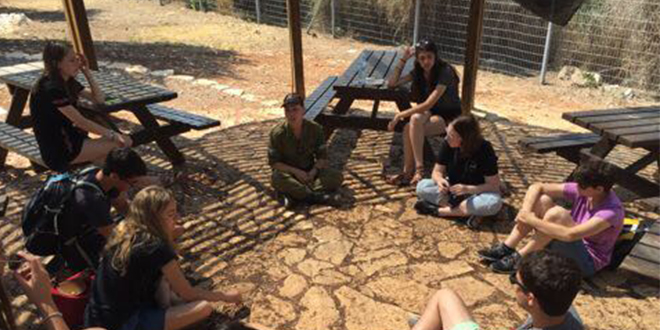07/03/2017
icnext Visits Havat Hashomer
- Share This Story

icnext participants meet with a female commander at Havat Hashomer.
israel.cleveland.next (icnext) is a unique two-year program that educates Jewish high school students from all denominations on the core issues of Israeli society and the geopolitical situation in the country today. Read a blog below about their experience visiting Havat Hashomer Army Base, a Federation-supported initiative for at-risk youth in Israel.
by Natalie Cohen
Imagine, a woman in her 20s responsible for delinquent male soldiers. These soldiers grew up with no support system, a criminal background or lived in a foster home. The female commanders at Havat HaShomer are in charge of shaping these young delinquents into the best soldier they can be - to get them up to an acceptable level for entry to the army. The soldiers are chosen through a very selective process. There is screening starting at age 16 with background checks, blood tests and much more. The soldiers at Havat HaShomer are placed in a special category which is the lowest category the army will accept. Due to Havat HaShomer it is likely that these men will get better deployments, but they must finish their basic training first. The difficulty in completing basic training is that most of these soldiers do not listen and they lack trust in any type of system. It is the commander's job to bring these soldiers from zero to one hundred.
When we visited this powerful army base we spoke with two commanders and a soldier. The commanders placed at Havat HaShomer are all female, so we heard the struggle of being a female solider with men who tend to lash out. The commanders sleep for about four hours a night as they always need to be looking after the men, whether it is waking them up in the morning or watching them eat to ensure there are not any food fights. Females are more powerful commanders for these men as most of the men would not hit a woman. They are more likely to hit a man as they never had a good relationship with male figures. It is very difficult for the soldiers to trust the commanders at first due to their past and they express their anger through yelling. The commanders never yell back; but rather, have a one on one conversation with the soldiers. Things like this help the soldiers grow. These commanders are teaching the soldiers how to fix their actions which helps them later in life when looking for a job after the army.
Personally I found the soldier we spoke with, Uriel, to be very interesting. The first thing he said to us was "I do not belong here and I don't even know why I'm here." His one hope was to be a fighter in the army but he is unable to due to medical conditions. Once he was told he could not be a fighter he wanted drop out and quit the army, but his therapist talked to him about many other opportunities that interested him like doing something with computer science. He told us that he is bored at the base because everything is so easy for him. The commanders push the soldiers to a level they have never been, and they always want to see how good you are. Uriel said that he has almost broken his arm from punching the wall just because he gets so annoyed with the other soldiers. He also said that it is more likely for the soldiers to listen to each other than to listen to the commanders so he always has to be ready to listen.
Our time at Havat HaShomer was very interesting and definitely a highlight of the trip.
For more information, contact Tal Rothstein at trothstein@jcfcleve.org.
israel.cleveland.next is a project of the Jewish Federation of Cleveland, administered by @Akiva.


Comments